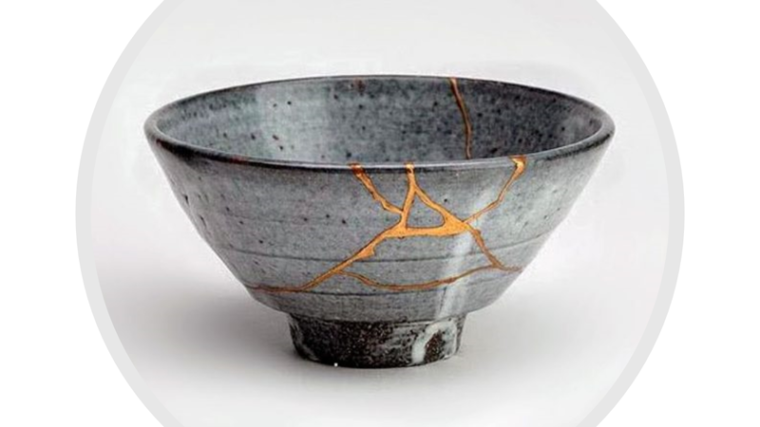Preface
This article aligns with my article submission for the Young Writers Program, managed by Press Services International. This program helps to provide a ready-source of content for the magazine publication Christian Today Australia.
The PSI/Christian Today article – my 30th – was first published Friday 5 November 2021 and is available here. This article takes inspiration from a friend’s article also on the same topic of Kintsugi.
View the full list of my articles here.
Introduction
The Japanese concept of kintsugi means ‘golden repair’. It is an ancient art of repairing broken pottery pieces using a mixture of lacquer and powdered gold, silver or platinum. The result is an object that is considered more valuable and beautiful than before. Its flaws are not hidden or discarded but become works of art – each one different and unique.
Kintsugi is a tangible expression and reminder that, as humans, we are all fallible and imperfect. We have weaknesses, flaws and aspects of ourselves we would rather hide away. However, to try and mask these imperfections or even attempt to get rid of them completely prevents us from seeing what these flaws could become.
Embrace the Imperfection
Do you berate yourself or look to see how someone else could be held responsible? What’s your first reaction when someone else fails to meet your expectations? Do you respond in understanding and empathy, or do you grit your teeth saying, “it’s fine, don’t worry about it”?
In kintsugi there is this idea that by highlighting and embracing our flaws we can live a life of integrity and authenticity. The notion of perfect vs imperfect is a fallacy. The standards around what is perfect are all relative and determined by culture, industry, and social media definitely exacerbates this.
However, when we accept our whole selves – and see that as our strength, we operate from a place of clarity. We don’t worry that we don’t meet the expected standard because we know that everyone else has their unique strengths and imperfections. We develop greater self-compassion which extends to others.
It takes courage to expose and admit our imperfections. It’s not about resigning ourselves to that fact that “that’s just the way I am, so deal with it”; and it’s not making excuses for our mistakes or bad behaviour.
It’s being ok with who we are and what we have done, but it’s also about taking responsibility for our actions and continually growing and learning to become the best version of ourselves.
Serenity Prayer: A Way Forward
God,
Grant me the serenity to accept the things I cannot change,
the courage to change the things I can,
and the wisdom to know the difference.
Serenity
Serenity is a synonym for peace. It is a state of mind of blissful harmony and pure thoughts. Our thoughts and the battlefield of our mind make it key to ensuring that when we focus on God – He will provide both the framework where we can fix our eyes mentally on Him. Jesus can be your peace. Accept that some things are just beyond your control – other people are also independent in their way of thinking.
Courage
Having a peaceful mind is one thing, but it should not lead to complacency or lethargy. Take the courage – be bold and take that small first step to venture out. Take responsibility as you find the courage to make a change – small things within your control. And do not be discouraged – but look forward and not behind.
Wisdom
God’s truth and teachings from His Word offer the ultimate framework for understanding right from wrong; and the pursuit of God’s wisdom can never lead you astray. Wisdom of knowing the difference between things within your control and things that are not is important.
Accept our Imperfection
When we accept our imperfections:
1. We become aware of the subtle messages pushing us to be perfect
Not everyone is going to be happy about our choice to embrace our imperfections. We may be subject to unwanted advice, criticism and efforts to “fix us”. Sometimes these “weaknesses” are just arbitrary standards that society has dictated. The beauty industry is a multi-billion dollar industry that exploits our fear of being physically imperfect. Their marketing seeks to make that emotive connection that we can aim for their standard of beauty. But beauty is also in the eye of the beholder – subjective and fluid.
2. We can push back and stand firm in our beliefs
When you receive messages that you should hide my “flaws”, that can lead to the feeling of incompleteness and unworthiness. When we learn to accept our own identity and are clear on what can’t change (or what is not worth changing), then we can truly focus on what really needs to be changed to make this world a better place.
3. We can have a closer connection with each other
An amazing shift in atmosphere happens when you have confidence, self-awareness and vulnerability to share your struggles. When you have a high level of self-awareness, you can also understand the impact of struggles on others and will be part of the process to make necessary changes. All of this increases the levels of trust and connection amongst the people we impact.
Embrace our Imperfection
At this point, if you have followed this journey, you would recognise and admitted to the fact – we are not perfect. You would also have a state of mind such that we accept our weaknesses. But, just like knowledge in our minds, it is just theory without action. So, in embracing our imperfection, we can move forward to have sustainable and positive impact through these actions:
1. Identify and articulate your imperfections
- Spend time recalling incidents, stories and words where you have felt embarrassed, uncomfortable, small, or humiliated.
- Learn to become more critically aware of the various inputs and voices that shape who you believe you are.
- This process might take a little while if you are so used to denying or burying your true feelings.
2. Accept and reframe your imperfections
- Practise self-compassion and accept these areas as part of your story.
- Reflect on these areas and what you have learnt from each of them, using the following questions as prompts:
- What positive ways have they shaped you?
- How do these experiences help you connect better with others?
- What sort of people or causes do you have greater empathy and compassion for?
- How do these situations make you angry or passionate?
- Embrace and be proud of the ways that your imperfections have strengthened you.
- Ultimately – own your story
3. Share your story
- Identify people that you trust and share what you are learning about yourself
- Look for opportunities to add unique value and apply these new learnings
- Imagine the kind of world we would live in if more of us were accepting of our unique experiences and used them for the benefit of others.
Christ: the Only Perfect One
Christ is the only person in history to be the ultimate model of perfection. As the sole sinless individual, He bore our sins of imperfection and when we believe and accept Him, His perfect love will turn our imperfections into a humble worthiness before God.
Jesus as the Perfect One was foretold throughout the Bible/Old Testament. Even during the days of Moses and the Israelites in Egypt, God promised His people that He would come to save them. The symbolism behind the elements of Passover herald the then future coming of Christ – the spotless first-born lamb to be sacrificed – Jesus was the ultimate lamb. The blood of that lamb shed and used to provide a sign of covering over the protected Israelites also parallels the perfect blood of Christ also shed on the Cross as a form of protection that we can receive in order for God’s wrath and judgement to pass over us.
And just as the events of the first Passover in Egypt represented God passing over and sparing judgement on His chosen people, today we can accept Jesus as Christ and also join in the passing over of God’s judgement – for He is the only Holy one. In His perfection, none can compare – yet through Christ our imperfection can be made perfect before Father God.
Together, by embracing our imperfections, we can model Christ and represent him, complete with all our weaknesses, to the world around us. Philippians 3:12 reminds us: Not that I have already become perfect, but I press on so that I may lay hold of that for which also I was laid hold of by Christ Jesus.

